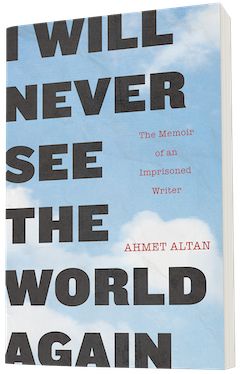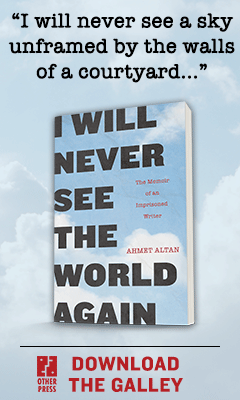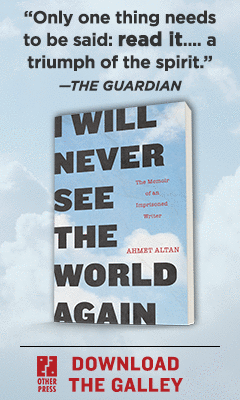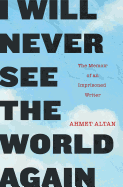I Will Never See the World Again: The Memoir of an Imprisoned Writer
by Ahmet Altan and Yasemin Çongar
In 2017, Turkish journalist and novelist Ahmet Altan sat in the back of a police car, on his way to prison. He had just received a life sentence without the possibility of parole. A policeman in the car with him offered a cigarette. Altan refused it. "I only smoke," he told the policeman, "when I am nervous."
Altan, of course, had long had reason to be nervous. The failed coup in July 2016 had resulted in a crackdown by Erdoğan's government on dissent, and journalists were being arrested by the dozen. Altan's sentence was handed down following a sham trial--Kafkaesque in its absurdity, by Altan's estimation--after he was found guilty on charges of conveying "subliminal messages."
Written from prison, Altan's memoir I Will Never See the World Again offers his reflections on imprisonment, writing and freedom. The memoir reaches the world by way of friend and translator Yasemin Çongar, who was granted occasional contact by phone with Altan and was permitted to receive personal notes from him through Altan's lawyer. Gathered from November 2017 to May 2018, these meditative letters comprise the memoir. Each becomes its own brief chapter, exploring topics both internally and externally centered.
Altan sketches his early-morning arrest in the first essay, "A Single Sentence." He is arrested at dawn. As he waits while officers search his house, he puts on a kettle for tea--just as his father, a Turkish politican, had done 45 years before, during his own arrest. And the history repeats itself in multiples: Altan's brother, also a journalist, is arrested the very same morning.
In the essay addressing his sentencing--in which the policeman offers him a cigarette--Altan admits that he'd never before thought about the circumstances under which he would smoke; the words just came out of his mouth like air: "It was as if someone inside me, a person whom I could not exactly call 'I' but who nevertheless spoke with my voice, through my mouth, and who was therefore a part of me, said as he was being transported in a police car to an iron cage that he only smoked when he was 'nervous.' That single sentence suddenly changed everything."
What changed? Altan felt a sudden tear in the fabric of his reality; through language--through the power of crafting his own narrative of the world around him--he could regain control. Otherwise enclosed in every sense, Altan wrestles with how to construct an outlook reclaiming some semblance of freedom. In his mind half of the time, he can be lost in thought, in his own world. The other half sees him addressing the world at hand: his cell in the prison Silivri, two hours' drive from Istanbul. His cell mates and 11,000 or so fellow inmates. His daily, still-frozen cheese sandwiches. His steel sink. His iron bed.
Altan basks in the freedom afforded by his mind, his focus on his words allowing him the agency of crafting, creating, even forgetting. "Forgetting," he eventually argues, "is the greatest source of freedom a person can have." Writing itself becomes "a magical paradox," which "enables you not only to forget but also to be remembered," ultimately allowing him a sense of control and continued consequence.
After Altan is convicted and sentenced to life without parole, alone in his cell, he does finally light a cigarette. Then another. But Altan continues to occupy a space that is simultaneously in his cell and outside of it. "You can imprison me but you cannot keep me here," he writes. "Because, like all writers, I have magic. I can pass through your walls with ease." He finds freedom through his words, and through his readers. Altan speaks directly to us, his readers, his friends: "Besides, I have friends all around the world who help me travel, most of whom I have never met. Each eye that reads what I have written, each voice that repeats my name holds my hand like a little cloud and flies me over the lowlands, the springs, the forests, the seas, the towns and their streets."
Though more than 50 Nobel Laureates, along with many authors, publishers and organizations, have called for his release, as of now his sentence has been upheld. But Altan is not broken; "[It's] a rite of passage for any writer to spend time in prison," he says with a laugh, chatting with his lawyer during a visit. For now, readers can afford him at least the freedom of reading and appreciating his words, carrying them around the world, asserting them in thoughts, actions and ideas, commuting his sentences into guidelines for more consciously living our own lives. --Katie Weed








_crop.jpg)